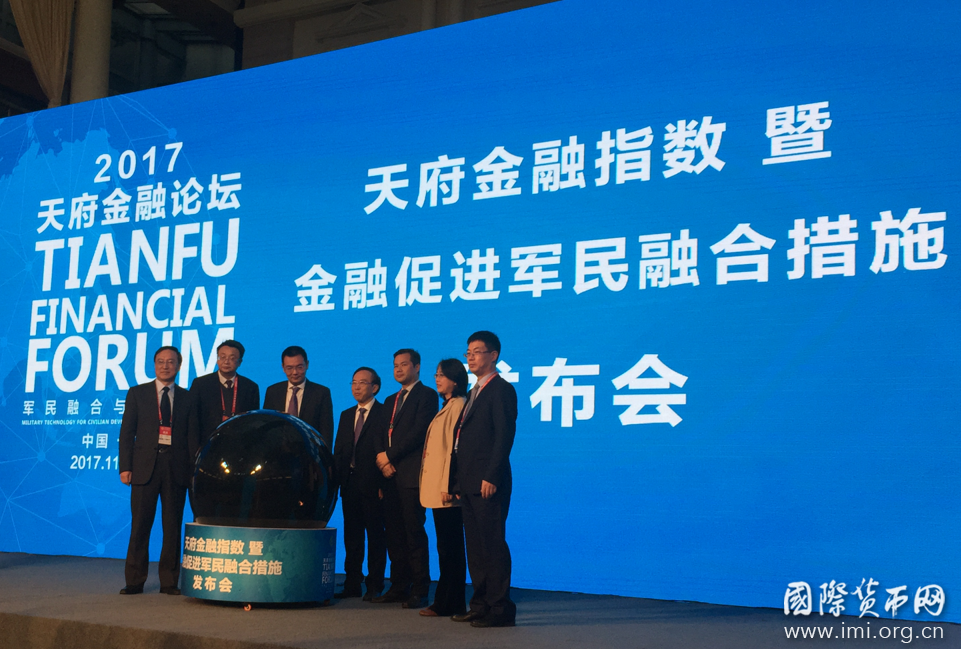2017 Tianfu Financial Forum—Press Conference of Tianfu Financial Index and Measures for Facilitating Civil-Military Integration through Finance
2017-11-24 IMI With the support from the School of Finance of Renmin University of China, IMI has successfully compiled TFFI, with the feature of combining “theory, policy and practice”. TFFI is based on the theory of financial center, with full consideration of national macro economic policies and financial development experience in terms of standard and empowerment. It also pays attention to the trend of the financial industry, shows the key areas of financial development, covers related indexes of the emerging financial industry, and reflects the features of different financial centers.
On behalf of his team, Professor He Qing briefly introduced the concepts and methods involved in the inventing process of TFFI. He pointed out that the first TFFI would cover 35 first-tier and second-tier cities, including one total index and eight sub-indexes in financial market, financial institutions, industry environment, human resources, finance and technology, green finance, cultural finance, and rural finance. The first TFFI is designed to reflect the financial development and features of each central city, to promote the understanding between different cities concerning financial development, and to strengthen each city’s competitiveness, promoting stagger competition and synergetic development. He also analyzed the rankings, advantages and disadvantages of major cities and presented his plans and suggestions for building Chengdu into a financial center in Western China.
Professor Chong Tai-Leung praised TFFI for its broadness, depth and advancement. He said that Hong Kong and Chengdu should strengthen cooperation in direct investment, financial technology and personnel training.
Professor Tan Songtao explained two ways of developing financial centers. He thought that financial development driven by government policies rather than the real economy was not sustainable, thus, finance should be in coordination with the economy. On the part of TFFI, he said we need to be objective when analyzing each city’s figures. High scores do not equal to top rankings. He also emphasized that each city should compare its performance not only with that of other cities, but also with its past one, so as to better understand and focus on the key areas of financial development.
Huang Yi, Director of Sichuan Tianfu Bank introduced the huge potential possessed by Sichuan Internet finance and consumer finance, and made a detailed explanation of Sichuan Tianfu Bank’s methods and experience of utilizing Internet and big data to develop inclusive finance.
In addition, 32 major media including CCTV, Sichuan News, Sichuan Daily and Chengdu TV covered the conference. Professor Tu Yonghong and Professor He Qing were interviewed after the conference.
With the support from the School of Finance of Renmin University of China, IMI has successfully compiled TFFI, with the feature of combining “theory, policy and practice”. TFFI is based on the theory of financial center, with full consideration of national macro economic policies and financial development experience in terms of standard and empowerment. It also pays attention to the trend of the financial industry, shows the key areas of financial development, covers related indexes of the emerging financial industry, and reflects the features of different financial centers.
On behalf of his team, Professor He Qing briefly introduced the concepts and methods involved in the inventing process of TFFI. He pointed out that the first TFFI would cover 35 first-tier and second-tier cities, including one total index and eight sub-indexes in financial market, financial institutions, industry environment, human resources, finance and technology, green finance, cultural finance, and rural finance. The first TFFI is designed to reflect the financial development and features of each central city, to promote the understanding between different cities concerning financial development, and to strengthen each city’s competitiveness, promoting stagger competition and synergetic development. He also analyzed the rankings, advantages and disadvantages of major cities and presented his plans and suggestions for building Chengdu into a financial center in Western China.
Professor Chong Tai-Leung praised TFFI for its broadness, depth and advancement. He said that Hong Kong and Chengdu should strengthen cooperation in direct investment, financial technology and personnel training.
Professor Tan Songtao explained two ways of developing financial centers. He thought that financial development driven by government policies rather than the real economy was not sustainable, thus, finance should be in coordination with the economy. On the part of TFFI, he said we need to be objective when analyzing each city’s figures. High scores do not equal to top rankings. He also emphasized that each city should compare its performance not only with that of other cities, but also with its past one, so as to better understand and focus on the key areas of financial development.
Huang Yi, Director of Sichuan Tianfu Bank introduced the huge potential possessed by Sichuan Internet finance and consumer finance, and made a detailed explanation of Sichuan Tianfu Bank’s methods and experience of utilizing Internet and big data to develop inclusive finance.
In addition, 32 major media including CCTV, Sichuan News, Sichuan Daily and Chengdu TV covered the conference. Professor Tu Yonghong and Professor He Qing were interviewed after the conference.
